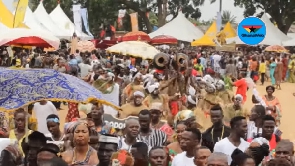It is a festival celebrated by the people of the Ada Traditional Area to remember their forefathers and ancestors and the bravery they showed during the many wars they fought to maintain their space in the past.
The Dangme fought many wars including the Katamanso war and the Glover war also known as Torjienya to mark their territory and protect their own.
After surviving these wars, the people of Ada emerged with the Asafotufiami festival as a commemorative measure in honour of their ancestors.
The festival is now the biggest among the Adas and is celebrated grandly. But this hasn’t always been the case, initially, every indigene would mark this festival in their homes but as time went by, leaders of the community; both traditional and religious came together to decide on making the festival a big one.
This was revealed in this edition of People & Places, by Stool Son of the Royal Kabiawe Yumu clan; Ayiko Akuako.
According to him, the festival begins on the first Thursday of August and lasts for a week.
“We celebrate Asafotufiami to remember our forefathers. At first, we had wars but we don’t anymore. Formerly, everybody will remember their ancestors in their homes but the priests, pastors and leaders came together from 1937, they started celebrating as a festival,” Ayiku Akuako said.
Explaining the rationale behind the name of the festival, he said the festival is made up of three unique words from different languages including Akan, Ewe and Dangme.
“It is a word they combined. Asafo means the warriors, tu is gun, fiami is firing. Simply we say, firing of musketries. The Asafo is for the Akans, Tu, Akans, Ewes and Dangmes call guns Tu, Fiami is the Dangme language,” he noted.
The festival involves rites including purification and cleansing rites, welcoming of visitors or revelers who join in, drumming and firing of guns by the warriors, dancing among other things.
In this episode of People & Places, we took a look at the festival in detail, albeit focusing on the first 4 days of the celebrations and what goes on during the period.
Join Wonder Ami Adu-Asare and her guest as we learn more in the interview below:
General News of Tuesday, 30 May 2023
Source: www.ghanaweb.com













